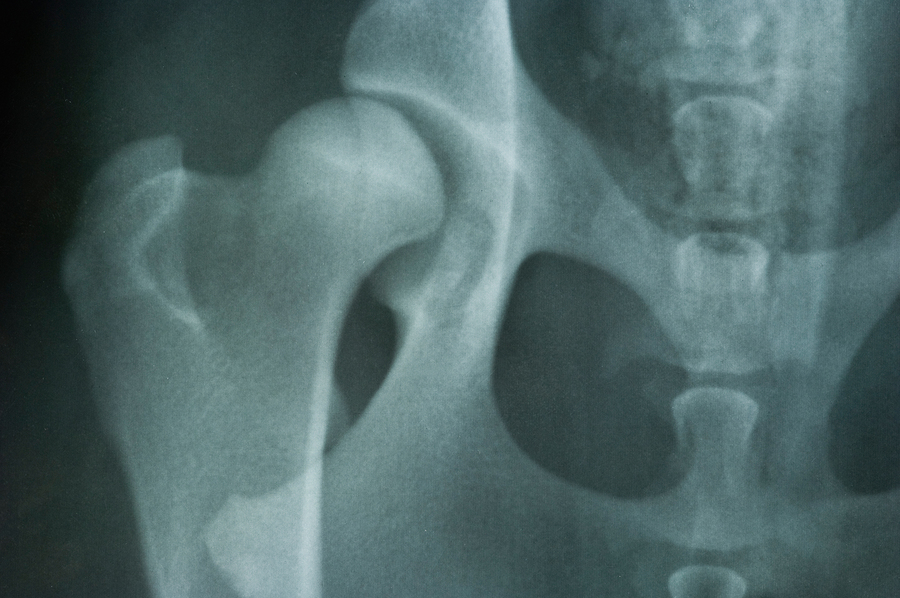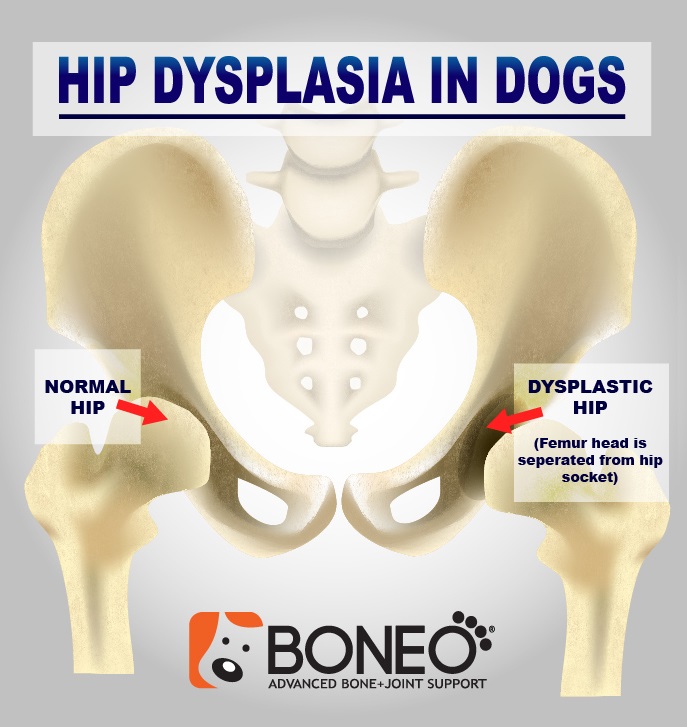
This post may contain affiliate links. We are compensated for referring customers to our affiliate partners.
Canine hip dysplasia is a chronic condition that might affect your dog. In a healthy dog, the hip socket is well rounded and deep enough so that the hip’s ball and socket joint fit together perfectly, with strong ligaments that offer support and hold everything in place. With hip dysplasia, the head of the bone doesn’t fit like it should in the socket, which causes the bone to slide against the surface of the shallow hip socket. Ligaments are weak and do not hold things in place like they should. Since everything is misaligned, bone spurs can develop, which make walking difficult and painful.
Recognizing Hip Dysplasia In Dogs
The Breeds Who Are Prone And The Signs They Have Shown
Certain breeds are more prone to this condition than others, such as:
- Labrador Retrievers
- Golden Retrievers
- Great Danes
- Bulldogs
- St. Bernards
- Rottweilers
- Mastiffs
- Pugs
- German Shepherds
Knowing the history of your dog is important as hip dysplasia often follows a pattern of genetics. If you know that one of your dog’s parents had hip dysplasia, you can start including Dog Supplements For Hip Dysplasia in your dog’s diet and watch for signs early on that your pup inherited the syndrome. Mild signs are usually present to start with, but they will worsen over time. Symptoms of hip dysplasia include:
- Lameness
- Stiff back legs when walking
- Running with a hop
- Stiffness when running or getting up
- Pain or discomfort when exercising
- Loss of muscle tone in hind legs
- Trouble getting up from a prone position
- Lack of enjoyment of physical activities your dog once loved
Vet Testing And Surgical Options
Your vet can determine if your dog is suffering from hip dysplasia by taking x-rays of the sockets and joints. Treatment options can vary, but surgery is the most common. There are a few types to choose, from less invasive surgeries to total hip replacement. Though total hip replacement is the most invasive and most expensive, it is also allows the dog to recover with full range-of-motion and full function without pain. There are, however, alternative options for those who have mild hip dysplasia, or those who simply cannot afford to have surgery.
Keeping Your Pup’s Weight Under Control
 When feeding your dog as a puppy, look for food that is high-quality, meaning that is has good protein sources, quality carbohydrates, and fat. This will keep your dog in optimum health to begin with so it will be strong enough to fight against whatever disease comes its way. As your dog ages, keeping him on a good weight management plan is essential for his joints. Dogs who carry extra weight will overstress the hip joints, making them more uncomfortable than they need to be. Some good weight management formulas on the market include:
When feeding your dog as a puppy, look for food that is high-quality, meaning that is has good protein sources, quality carbohydrates, and fat. This will keep your dog in optimum health to begin with so it will be strong enough to fight against whatever disease comes its way. As your dog ages, keeping him on a good weight management plan is essential for his joints. Dogs who carry extra weight will overstress the hip joints, making them more uncomfortable than they need to be. Some good weight management formulas on the market include:
- Nutro Ultra Weight Management Dry Dog Food
- ams ProActive Health Healthy Weight Dry Dog Food
- Purina Pro Plan Weight Management Dry Dog Food
Dog Supplements For Hip Dysplasia: Glucosamine
Glucosamine is probably one of the most important Dog Supplements For Hip Dysplasia that you can feed your pooch. Glucosamine has been widely studied and used for healing wounds, stomach disorders, and joint disease for years. Though it naturally occurs in the bodies of living animals, it is typically processed until it is unable to be of use. But being such an important Dog Supplements For Hip Dysplasia, glucosamine is widely available in supplemental form. It is found in high concentrations in the shells of crustaceans, and therefore can be very cost effective.
Dog Supplements For Hip Dysplasia: Chondroitin
With the exact same benefits as glucosamine, this product is also used to treat hip dysplasia and joint issues in dogs and other animals. The supplemental version is found in cow, shark, and whale cartilage. Most of the supplements are made from cow cartilage as the ecological implications are lower. Both chondroitin and glucosamine work by helping to build new cells and restructure the cartilage in the joints. The best thing about these two Dog Supplements For Hip Dysplasia is that there have been no know side effects.
Purchasing Dog Supplements For Hip Dysplasia
You can use these supplements for the rest of your dog’s life if need be. There are several brands on the market that include both ingredients together, such as:
- Nutramax Cosequin DS Plus
- Nutramax Dasuquin with MSM
- Infinite Pet Supplement For Dogs
- MaxxiFlex Dog Joint Supplement
Sizes may vary based on the size of your dog. Remember that should you stop the use of Dog Supplements For Hip Dysplasia, the cartilage will begin to break down again a few months after discontinuation. Finding a good supplement is essential, so speak to your vet about recommendations for your dog based on severity of dysplasia, weight, and size of your pet.
Dog Foods That Contain Dog Supplements For Hip Dysplasia
You can purchase many different dog foods that include Dog Supplements For Hip Dysplasia in the form of glucosamine and chondroitin. It’s important that you choose high quality brands that are full of other ingredients that are good for you dog, such as high quality protein sources, important vitamins and minerals, and natural omega-3 fatty acids that can decrease the severity of dysplasia development. Some great choices include:
- Blue Buffalo Freedom Grain-Free Recipe
- Hill’s Science Diet Adult Healthy Mobility
- Merrick Texas Beef And Sweet Potato Recipe
- CANIDAE Life Stages Duck Meal, Brown Rice, & Lentils
- Purina Pro Plan Shredded Blend Chicken Formula
Treats That Include Dog Supplements For Hip Dysplasia
For your good-boy or good-girl who like to have a treat, why not choose one that has Dog Supplements For Hip Dysplasia included? Some good brands to try are:
Hip dysplasia might be a part of your dog’s life, but pain doesn’t have to be. By taking the steps from a young age to control your pup’s weight and provide cartilage-building supplements, you’ll be giving your dog a leg-up toward good health.


I have a lab pup she is 7 months old and has hip displacia,,im looking at getting some supplements for her,,surgery is not possible atm…any suggestions would be greatly appreciated..lesley